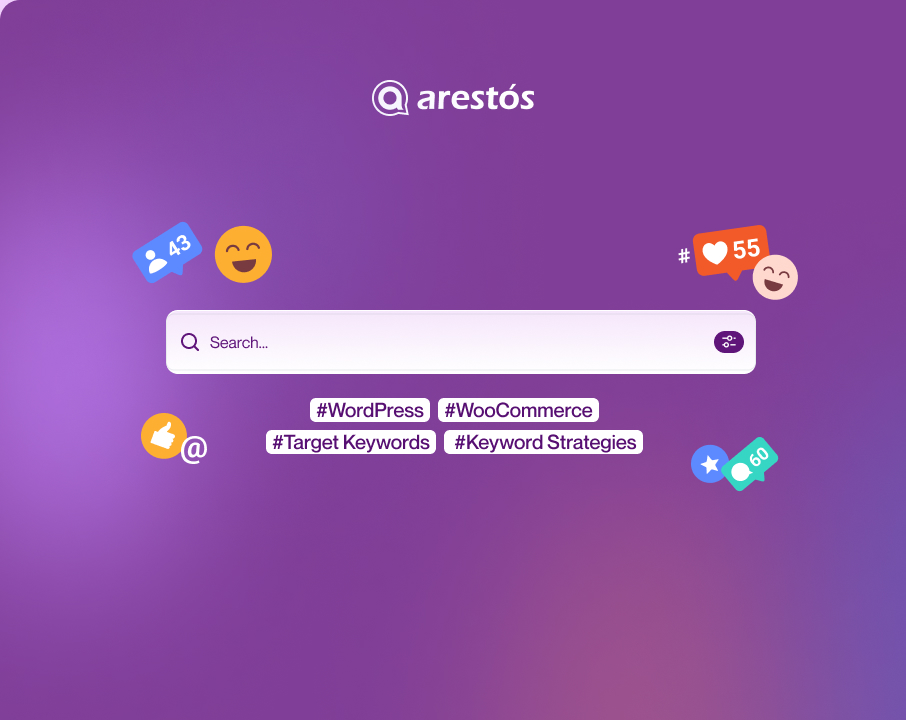Keyword Research Tips for WordPress WooCommerce Stores
In the highly competitive online marketplace, visibility is crucial for the success of your WordPress WooCommerce store. One of the most effective ways to improve your store's visibility and drive targeted organic traffic is through search engine optimization (SEO). And at the core of any successful SEO strategy lies keyword research.
In the highly competitive online marketplace, visibility is crucial for the success of your WordPress WooCommerce store. One of the most effective ways to improve your store’s visibility and drive targeted organic traffic is through search engine optimization (SEO). And at the core of any successful SEO strategy lies keyword research.
Keyword research involves identifying the specific words and phrases that potential customers use when searching for products or services online. By understanding and targeting these keywords, you can optimize your WooCommerce store to rank higher in search engine results pages (SERPs), attract more qualified visitors, and increase your chances of conversions.
In this blog, we will dive deep into the world of keyword research for WooCommerce stores. We’ll explore various techniques and strategies to help you identify the right keywords that align with your products, target audience, and business objectives.
Understanding Keyword Research
Definition of keywords and their role in SEO
Keywords are the specific words and phrases that users enter into search engines when looking for information, products, or services. In the context of SEO, keywords play a vital role in optimizing web pages to improve their visibility in search engine results.
Search engines use keywords to understand the content and relevance of web pages, and they match these keywords with user search queries. By incorporating relevant keywords strategically throughout your WooCommerce store’s content, you can increase the likelihood of your pages appearing in search results and attracting targeted organic traffic.
Types of keywords relevant to WordPress WooCommerce stores
- Short-tail keywords: These are brief and general keywords that typically consist of one or two words. They have a high search volume but are highly competitive. Examples include “shoes,” “electronics,” or “kitchen appliances.” While short-tail keywords may generate a large amount of traffic, they may not always lead to high conversion rates due to their broad nature.
- Long-tail keywords: Long-tail keywords are more specific and typically consist of three or more words. They have lower search volume but tend to be less competitive. Examples include “running shoes for men,” “best budget smartphones,” or “organic baby food online.” Long-tail keywords often attract more targeted and qualified traffic, leading to higher conversion rates.
- Product-specific keywords: These keywords are directly related to the specific products or services you offer in your WooCommerce store. They include brand names, model numbers, or specific features. Examples include “Nike Air Max 90,” “iPhone 12 Pro Max,” or “organic gluten-free pasta.” Targeting product-specific keywords helps capture users who are actively searching for a particular item, increasing the chances of conversion.
Tools for conducting keyword research
- Google Keyword Planner: This free tool by Google is designed specifically for keyword research. It provides insights into search volume, competition, and keyword ideas based on user search queries. Google Keyword Planner is an excellent starting point to identify relevant keywords for your WooCommerce store.
- SEMrush: SEMrush is a comprehensive SEO tool that offers robust keyword research capabilities. It provides detailed keyword analysis, search volume data, keyword difficulty scores, and competitor analysis. SEMrush allows you to uncover valuable keyword opportunities and gain insights into your competitors’ keyword strategies.
- Moz Keyword Explorer: Moz Keyword Explorer offers an intuitive interface for keyword research. It provides valuable metrics such as search volume, keyword difficulty, organic click-through rates, and potential keyword opportunities. Moz’s tool helps you identify keywords that align with your WooCommerce store’s objectives and target audience.
- Other useful keyword research tools: Apart from the aforementioned tools, there are several other useful options available, such as Ahrefs Keyword Explorer, KeywordTool.io, and Ubersuggest. These tools offer unique features and insights that can enhance your keyword research process.
Using these tools, you can uncover relevant keywords, analyze their search volume and competition, and gain valuable insights to optimize your WordPress WooCommerce store’s content effectively.
Identifying Target Keywords for WordPress WooCommerce Stores
Analyzing your products and target audience
Before diving into keyword research, it’s crucial to have a clear understanding of your WooCommerce store’s products and your target audience. Analyzing your products involves identifying their unique features, benefits, and any specific attributes that set them apart from competitors. This analysis will help you uncover keywords that directly relate to your products and resonate with your target audience.
Similarly, understanding your target audience is essential for effective keyword research. Consider their demographics, interests, and pain points. Put yourself in their shoes and think about the words and phrases they would use when searching for products similar to yours. This empathetic approach will help you identify keywords that align with your audience’s search intent.
Brainstorming relevant keywords
Once you have a clear understanding of your products and target audience, it’s time to brainstorm relevant keywords. Start by making a list of seed keywords—broad terms that encompass your products or industry. Then, expand on these seed keywords by generating variations and combinations that reflect different aspects of your products.
Consider using keyword modifiers like “best,” “top,” “affordable,” “reviews,” “buy,” or location-based terms if applicable. Think about specific product features, use cases, or benefits that your audience may search for. Utilize synonyms, related terms, and industry-specific jargon to broaden your keyword list further.
Using competitor analysis to discover potential keywords for WordPress WooCommerce Stores
Competitor analysis can be a valuable source of keyword inspiration. Identify your main competitors within the WooCommerce ecosystem and analyze their websites and content. Look for keywords they are targeting and ranking for, particularly on product pages, category pages, and blog posts.
You can use SEO tools like SEMrush or Moz to analyze your competitors’ organic keywords and see which ones are driving traffic to their sites. Look for patterns, identify gaps, and find opportunities to differentiate your store by targeting keywords that competitors might have missed.
Leveraging customer feedback and reviews for keyword ideas
Your customers’ feedback and reviews can provide valuable insights into the language they use when discussing your products. Look for recurring keywords or phrases that appear in positive reviews, testimonials, or social media comments. These user-generated keywords can offer unique perspectives and help you discover long-tail keywords or specific terms that resonate with your audience.
Additionally, pay attention to any pain points or problems mentioned by customers. By addressing these concerns through keyword optimization, you can attract potential customers who are actively searching for solutions to those specific issues.
Incorporating customer feedback and reviews into your keyword research helps you align your content with the language and needs of your target audience, ultimately improving the relevance and effectiveness of your SEO efforts.
See more: 5 reasons why you should use WooCommerce for your eCommerce web
When selecting keywords for WordPress WooCommerce stores, consider keyword metrics and relevance.
Understanding search volume and competition
When evaluating keywords for your WooCommerce store, it’s important to consider two key metrics: search volume and competition.
Search volume refers to the number of searches performed for a particular keyword within a given timeframe. Higher search volume indicates a greater potential for attracting organic traffic. However, keep in mind that high search volume keywords often come with increased competition, making it challenging to rank prominently in search results.
Competition, on the other hand, refers to the level of competition among websites trying to rank for a specific keyword. Highly competitive keywords typically have more established and authoritative websites vying for top positions. It’s important to strike a balance between search volume and competition to find keywords that offer a reasonable chance of ranking well.
Assessing keyword relevance to your WordPress WooCommerce store
While search volume and competition are important, keyword relevance to your WooCommerce store should be a top consideration. Relevance ensures that the keywords you target align closely with your products, target audience, and overall business goals.
Assess the intent behind each keyword and ask yourself if it accurately represents what your store offers. Consider whether a searcher using that keyword would find value in landing on your store’s page. Ensuring relevance not only improves the user experience but also increases the likelihood of conversions and customer satisfaction.
Identifying high-value keywords with low competition
While it may be tempting to target high-volume, competitive keywords, it’s often more effective to identify high-value keywords with low competition. These keywords may have lower search volumes, but they offer a greater chance of ranking well and attracting targeted traffic.
Look for keywords with moderate search volumes that still demonstrate commercial intent. These keywords indicate that searchers are more likely to convert into customers. By targeting these less competitive keywords, you can increase your chances of ranking higher and driving qualified traffic to your WooCommerce store
Utilizing long-tail keywords for niche targeting
Long-tail keywords, which consist of three or more words, can be highly valuable for niche targeting. Although they generally have lower search volumes, long-tail keywords often have less competition and higher conversion potential.
Long-tail keywords tend to be more specific and capture users who are further along in their purchase journey. For example, instead of targeting a generic keyword like “shoes,” you could optimize for a long-tail keyword like “women’s running shoes for flat feet.” By tailoring your content to long-tail keywords, you can attract a highly relevant and engaged audience actively seeking the specific products or solutions your WooCommerce store offers.
Organizing and Implementing Keywords
Creating a keyword list or spreadsheet
To effectively organize and implement keywords for your WooCommerce store, start by creating a keyword list or spreadsheet. This will serve as a central repository for all the keywords you’ve identified during your research. Include columns for the keyword itself, search volume, competition, and any other relevant metrics you find valuable.
Having a keyword list or spreadsheet helps you stay organized and enables easy reference when optimizing your store’s content.
Grouping keywords based on product categories
Grouping keywords based on product categories allows for better organization and targeted optimization. Review your keyword list and categorize keywords according to the relevant product categories in your WooCommerce store.
For example, if your store sells clothing, you might have categories like “Women’s Tops,” “Men’s Shoes,” or “Children’s Accessories.” Assign keywords to their respective categories to streamline the optimization process and ensure that the right keywords are associated with the appropriate products or pages.
Mapping keywords to specific pages or products in WordPress WooCommerce
After categorizing keywords based on product categories, map each keyword to specific pages or products in your WooCommerce store. Consider the intent behind each keyword and identify the most suitable page or product to optimize.
For example, if you have a keyword related to “best women’s running shoes,” map it to the corresponding category page or individual product page that showcases the best women’s running shoes you offer.
By mapping keywords to specific pages or products, you can ensure targeted optimization and improve the overall relevance of your content.
Incorporating keywords naturally into content, titles, and meta tags
To optimize your WooCommerce store for SEO, it’s important to incorporate keywords naturally into your content, titles, and meta tags. Avoid keyword stuffing, which can lead to a poor user experience and potential penalties from search engines.
Incorporate keywords strategically in the following areas:
- Product titles: Optimize product titles to include relevant keywords while still maintaining a descriptive and com
- Product descriptions: Craft product descriptions that incorporate keywords naturally, focusing on providing valuable information and addressing customer needs.
- Category pages: Include relevant keywords in the titles, headings, and content of category pages to enhance their visibility for search engines.
- Meta tags: Write compelling meta titles and descriptions for each page, including target keywords in a concise and appealing manner.
- Image alt tags: Use descriptive and keyword-rich alt tags for product images to improve their visibility in image search results.
Remember, the goal is to create content that is user-friendly, informative, and engaging. By incorporating keywords naturally and providing high-quality content, you can improve your store’s visibility in search engine results while offering a positive experience to your customers.
Monitoring and Adjusting Keyword Strategy for WordPress WooCommerce Stores
Tracking keyword rankings and performance
Once you’ve implemented your keyword strategy for your WordPress WooCommerce store, it’s important to regularly track the rankings and performance of your target keywords. Monitor how your keywords are performing in search engine results pages (SERPs) and assess any changes in rankings over time.
Use SEO tools such as Google Search Console, SEMrush, or Moz to track keyword rankings and gather data on impressions, clicks, and organic traffic for each keyword. This data will help you gauge the effectiveness of your keyword optimization efforts and identify areas for improvement.
Analyzing user search behavior and adapting keywords accordingly
User search behavior is constantly evolving, and it’s crucial to analyze and understand how your target audience is searching for products or services. Monitor search trends, user queries, and changes in search patterns to gain insights into the evolving needs and preferences of your potential customers.
By analyzing user search behavior, you can identify new keyword opportunities, discover emerging search trends, and adapt your keyword strategy accordingly. Consider incorporating trending topics or industry-specific terms that align with your WooCommerce store and target audience.
Staying updated with evolving trends and new keyword opportunities
SEO is a dynamic field, and it’s important to stay updated with evolving trends and new keyword opportunities. Regularly read industry publications, blogs, and forums to stay informed about the latest developments in your niche.
Additionally, keep an eye on your competitors and industry leaders to see what keywords they are targeting and any emerging trends they are capitalizing on. Identify gaps or untapped areas where you can differentiate your store and target keywords that competitors might have missed.
By staying updated with evolving trends and new keyword opportunities, you can ensure that your keyword strategy remains relevant and effective in capturing the attention of your target audience.
Making data-driven adjustments to improve SEO results for WordPress WooCommerce Stores
Data should drive your decision-making when adjusting your keyword strategy. Analyze the data you’ve collected, including keyword rankings, website traffic, user engagement metrics, and conversion rates. Identify keywords that are underperforming or not driving the desired results.
Based on the data analysis, make data-driven adjustments to your keyword strategy. This might involve optimizing underperforming pages, revising content to better align with user search intent, or targeting new keywords that show potential based on data insights.
Continuously monitor and test the impact of these adjustments. Track the changes in keyword rankings, organic traffic, and conversion rates to measure the effectiveness of your revised keyword strategy.
Remember, SEO is an ongoing process, and keyword strategies need to be flexible and adaptable. By monitoring keyword rankings and performance, analyzing user search behavior, staying updated with trends, and making data-driven adjustments, you can continuously improve your WordPress WooCommerce store’s SEO results.
Conclusion
In conclusion, optimizing your WordPress WooCommerce store’s keyword strategy is crucial for improving your store’s visibility, attracting targeted organic traffic, and driving conversions. By understanding the importance of monitoring keyword rankings, analyzing user search behavior, staying updated with evolving trends, and making data-driven adjustments, you can refine and enhance your keyword strategy over time.
Continuously refine and adapt your keyword strategy based on user needs, industry trends, and data insights to ensure that your WordPress WooCommerce store remains competitive in the online marketplace. By staying proactive and responsive, you’ll be able to maintain and improve your store’s SEO performance, ultimately driving the success of your WooCommerce business.
Contact us for a free consultation and to learn how Arestos can collaborate to create a custom WooCommerce online store that drives sales.



